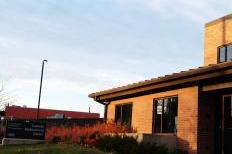






 Catholic Multicultural CenterUndocumented members of the Madison community who have considered applying for deferred action await the results of next week’s election with a mixture of anxiety, anticipation, and hope.
Catholic Multicultural CenterUndocumented members of the Madison community who have considered applying for deferred action await the results of next week’s election with a mixture of anxiety, anticipation, and hope.
This June when the Obama administration announced it’s Deferred Action for Childhood Arrivals initiative, spirits in Madison’s immigrant community soared. Over 300 attended Centro Hispano’s August information session clarifying the terms of the program and the documents needed to apply.
The initiative allows individuals who meet certain criteria to apply for a two-year work authorization that will protect them from deportation for that time.
As of Oct. 10, 179,794 requests for deferred action had been accepted for processing, according to the U.S. Citizenship and Immigration Services.
“People have been very upbeat about the possibility of applying for [deferred action],” said Madison Ald. Shiva Bidar-Sielaff, member of the Latino Support Network Executive Committee.
Salvador Carranza has observed the mood of the community since Aug. 15 when the policy change took effect as some consider the risks of a potential political shift after the Nov. 6 election.
A portion of the community fears the abundant information required by the deferred action application will be used against them if President Obama is not re-elected, said Carranza who serves as the president for Latinos United for Change and Advancement and chair of the Latino Education Council in Dane County.
Gov. Mitt Romney, Republican candidate for president, has said he will not deport individuals who have received deferred action but will end the program in favor of alternative immigration reforms.
According to the National Immigration Law Center, information provided in deferred action applications will not be shared with U.S. Immigration and Customs Enforcement nor U.S. Customs and Border Protection for deportation purposes. Only in cases that involve fraud, crime or a threat to national security could the information be shared and used for deportation.
Members of Madison’s Latino community are hopeful that the elected candidate will pursue comprehensive immigration reform, Bidar-Sielaff said.
Still apprehension remains.
“I think that a lot of the people are probably saying, ‘I’m going to fill in everything, have everything ready, and if President Obama is re-elected then I’ll go and apply,” Carranza said. “But if he is not re-elected, I’m just not going to send it out.’ Period.”
Since July, local groups have been organizing to help members of the Madison community apply for deferred action. On Nov. 16, the Catholic Multicultural Center will host its third workshop designed to answer applicants’ questions and demystify the registration process.
To apply for deferred action, applicants must have been under 31 on June 15, brought to the US when they were younger than 16, continuously lived in the U.S. since June 15, 2007, and have pursued or are in the process of pursuing an education. Honorable discharge from the military is acceptable in lieu of completing the required education.
The Latino Support Network, Latinos United for Change and Advancement, Community Immigration Law Center, Jewish Social Services and Centro Hispano are co-sponsoring the workshops.
The advocates who helped to organize the workshops and volunteers who have helped at the events hope to avoid applications being rejected on technicalities.
Workshop attendees sign up for timeslots and first receive help from one of the volunteers. An immigration lawyer then looks over the application to ensure its completeness. Often at the CMC workshops volunteers outnumber the attendees, Carranza said.
The workshops are important to clarify misconceptions about the deferred action initiative. It is not the DREAM Act. It does not confer resident status for college tuition, as that is determined on a state-by-state basis. And, it is not a pathway to citizenship. It is a temporary, two-year benefit.
Even this temporary fix can improve the quality of life for members of the local immigrant community, said Ramona Natera, an attorney at the Madison Catholic Multicultural Center.
“With work authorization you can obtain a Social Security number. With a Social Security number, you can obtain a driver’s license,” Natera said. “So something like a rite of passage where you can get your driver’s license in high school is not happening in this community up until now. That’s why this is so huge.”
Carranza agrees but emphasizes the economic benefits of deferred action.
“We keep hearing how we have all these millions of jobs that we cannot fill, because we don’t have the people with the skills to fill them. I say, ‘We have a lot of those people. We just don’t let them.’ Deferred action, if it continues, will really give a lot of our businesses the opportunity to find the skilled workforce that they need.”
The next two workshops to help deferred action applicants will take place November 16 and December 21.
|
|
|
Welcome to the Madison Commons, a website designed to provide news and information about all of Madison's neighborhoods and a crossroads for the discussion of community issues. The name comes from the idea of a village commons, a place for news, talk, debate, and some entertainment, too, that's open to everyone.
All rights reserved. Read more about the Madison Commons and its partners.

